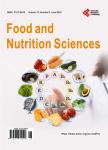Adverse Effects of Monosodium Glutamate on Liver and Kidney Functions in Adult Rats and Potential Protective Effect of Vitamins C and E
Adverse Effects of Monosodium Glutamate on Liver and Kidney Functions in Adult Rats and Potential Protective Effect of Vitamins C and E作者机构:Department of Food Nutrition King Saud University Riyadh Saudi Arabia Department of Food Science and Technology Faculty of Agriculture-El-Shatby Alexandria University Alexandria Egypt
出 版 物:《Food and Nutrition Sciences》 (食品与营养科学(英文))
年 卷 期:2012年第3卷第5期
页 面:651-659页
学科分类:1002[医学-临床医学] 100201[医学-内科学(含:心血管病、血液病、呼吸系病、消化系病、内分泌与代谢病、肾病、风湿病、传染病)] 10[医学]
主 题:Monosodium Glutamate Hepatic Stress Renal Stress Alanine Aminotransferase γ Glutamyle Transferase Creatinine Total Bilirubin
摘 要:Monosodium glutamate (MSG) was administrated to rats at doses of 0.6 and 1.6 mg/g body weight for 14 days. Body weight and relative liver and kidney weight of rats were significantly increased. On regard to liver functions, the activities of alanine aminotransferase (ALT) and γ glutamyle transferase (GGT) significantly increased in the serum, on MSG administration, meanwhile, serum total protein, albumin and serum total bilirubin significantly decreased. MSG had adverse effects on kidney functions as serum urea and serum creatinine were significantly increased. Vitamin C (0.3 mg/g body weight) and vitamin E (0.2 mg/g body weight) co-adminstrated with MSG, significantly restored the body weight and relative liver and kidney weights to control levels. In the presence of vitamin C and vitamin E the activities of ALT and GGT in the serum were also significantly reduced to become comparable with control trail. Consequently, serum total protein, albumin and serum total bilirubin were significantly increased in the serum, while serum urea and serum creatinine were significantly decreased after administration of each vitamin. The results showed that MSG at doses of 0.6 and 1.6 mg/g of body weight may cause an adverse effect on the hepatic and renal functions which might be due to oxidative stress induced by MSG on the liver and renal tissue. Supplementation of vitamin C and vitamin E was capable of ameliorating MSG-induced oxidative stress on hepatic and renal functions.



